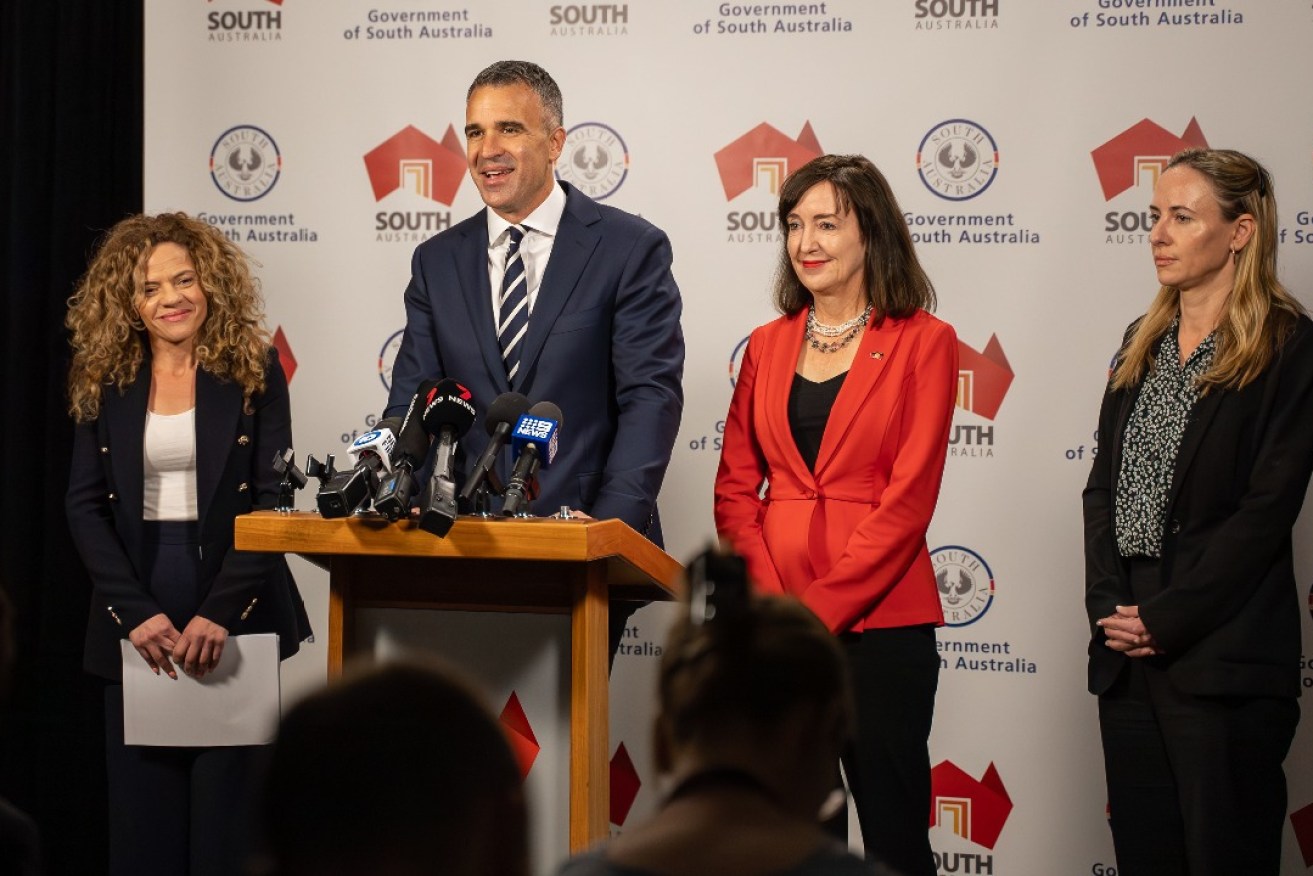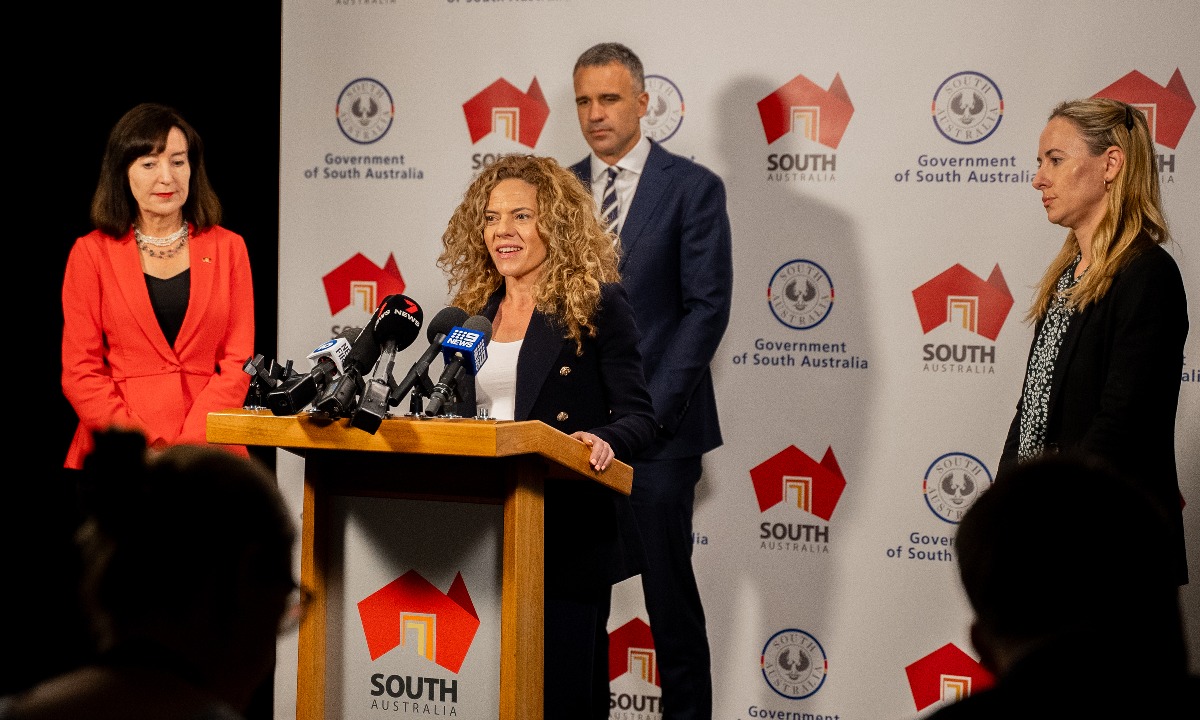Uni merger gets green light amid crossbench rift
The merger of the University of Adelaide and UniSA will pass state parliament after the Malinauskas Government secured the support of two Upper House crossbenchers, with the deal already sparking a rift within the minor parties.


SA-Best MLC Connie Bonaros, Premier Peter Malinauskas, Deputy Premier Susan Close and One Nation MLC Sarah Game at a press conference today. Photo: supplied
SA-Best MLC Connie Bonaros and One Nation MLC Sarah Game appeared at a state government press conference this morning to announce they would support the legislation required to create the new Adelaide University.
With their vote, the Malinauskas Government does not need support of the Liberal Party or the Greens in the Upper House to merge the two universities. Both parties have flagged ongoing concerns with the amalgamation.
It also means the merger will clear its most significant hurdle ahead of its planned opening in January 2026. University of Adelaide vice-chancellor Peter Høj told staff in July they would have to “pull the pin” on the merger if legislation was rejected.
The Bill to create the new Adelaide University will be introduced to parliament today, Premier Peter Malinauskas said.
“This is a historic agreement which has now got the ability to set South Australia up to have one of the finest universities not just in the country but also anywhere in the world,” he said.
The Premier also announced the government would be increasing the size of its financial contribution to the merger, with a $100 million perpetual fund supporting low socioeconomic (SES) student enrolments at the new university increased to $120 million.
Flinders University will also gain access to a $40 million perpetual fund for the same purpose, after vice-chancellor Colin Stirling raised concerns that low SES students wanting to study at Flinders would be disadvantaged.
Malinauskas today praised Bonaros and Game for having the “wherewithal… to look at the evidence, examine it thoroughly, and independently form their own opinions about what is in the best interest of the state”.
“I think everybody gets into politics regardless of the ideology… wanting to do something good for the state in the long term, and they have elected to support this legislation to achieve that,” he said.
“I’m very, very grateful to them indeed.”
Bonaros, a member of the parliamentary committee examining the merger, said she was primarily convinced by the evidence heard during the inquiry.
She denied cutting a deal with the government to get support for her own legislative priorities.
“I approached this issue with a very open mind about the pros and cons of a merger,” she said.
“I have to agree with the Premier and the Deputy Premier at the end of that process, it was crystal clear to me that there were significant gains here for the South Australian community as a whole.
“I think it became very clear throughout that process that there were areas for improvement, and I’m exceptionally pleased with the outcome today in terms of the additional $60 million dollars.”
But Bonaros’ support for the merger has already laid bare a rumoured rift between her and fellow SA-Best MLC Frank Pangallo.
Pangallo told InDaily: “I did not support what Connie did today.”
“You might want to ask the Premier if he will now be doing deals with the ‘new alliance’ of One Nation and Ms Bonaros to get his agenda through the Upper House?
“I made it clear from the start that I wasn’t opposed to the merger but I needed to first be convinced it was in the best interests of South Australian taxpayers and the broader tertiary sector.”

Frank Pangallo. Photo: Tony Lewis / InDaily
Pangallo said he “didn’t want to be rushed” because he committed to engage with other stakeholders once the committee’s report was finalised.
“I wanted to absorb it and see how it would impact on them and what else may have been required to see it through when there are real risks, as the committee identified,” he said.
“I told the Premier this a week ago but clearly he was impatient.
“This is a big deal that needs proper scrutiny. Yet it hasn’t even been on the table for 24 hours and we haven’t seen the legislation.”
Bonaros denied that her support for the merger indicated SA-Best was divided on the proposal.
“I am speaking, of course, for myself, but I have had the benefit of three months of an inquiry process that Frank hasn’t had the benefit of,” she told reporters.

SA-Best MLC Connie Bonaros speaking at today’s press conference. Photo: supplied
“I am extremely hopeful that everyone in parliament will support this – I think the best outcome is for a unanimous decision of parliament.
“However, what Frank has said is he hasn’t had the benefit of that process and he will take a little longer to land on his decision.
“I respect that, he respects the fact that I’ve been through that process.”
Bonaros also said she wanted to provide “certainty” to the staff and students at the two merger universities about their future.
Sarah Game, also a committee member, said she backed the legislation because “it became clear throughout the committee process that this was… going to give our state the best chance of improving our economic position”.
Asked if she had reached any agreement with the government on support for other legislation, Game said: “I think with a decision this big… one can only take their position on the merits.
“I would never make a decision on something this big if I didn’t agree with it fundamentally,” she said.
The State Government and universities say the new Adelaide University will add $500 million to the state’s economy per year, educate more than 70,000 students and create an additional 1200 jobs.
In its final report tabled on Tuesday, the parliamentary committee examining the merger found “the economic and social interests of the State of South Australia would likely be advanced by the amalgamation”.
However, the Opposition and the Greens filed minority reports with more cautious conclusions, arguing the majority report underestimates some of the risks of the proposal.
Greens MLC Robert Simms criticised the government’s deal with the crossbench, saying it was “profoundly disappointing to see Connie Bonaros giving the Government a blank cheque on this bill when amendments haven’t even been filed”.
“The dud deal negotiated by One Nation and Ms Bonaros falls well short of what’s required and misses a big opportunity for higher education in our state.”
“Any new university could have led the nation with modern governance arrangements, protections for workers and more input from staff and students into its decision making.
“Instead, Ms Bonaros and One Nation have signed up to a dud deal without even giving their colleagues the opportunity to file amendments to the bill.”
The Greens and the Liberal Party are yet to announce how they will vote on the merger.
Opposition education spokesperson John Gardner said the extra $60 million committed today is “fine” but he wanted to hear more from the government about what they would be doing to mitigate the risks of the merger.
He also highlighted that Flinders University does not have equal access to research funding under the deal, given the new Adelaide University will be receiving the proceeds of a $200 million perpetual research fund.
“The research funding being given to Adelaide University is to enable them to get the services of high-level researchers,” Gardner said.
“The easiest way that you’re going to be able to get a new researcher operating at the sort of level that will increase your (university’s) rankings is to encourage somebody to move across town rather than to move to another country.
“So Flinders is really vulnerable now to seeing some of their research staff look at positions made available at the new Adelaide University, paid for by the South Australian taxpayer, that won’t see a net benefit to the South Australian community.”
Malinauskas indicated that a perpetual research fund would not be made available to Flinders.
“Flinders University have been in receipt of a lot of government support in different forms over the years,” the Premier said.
“We will continue as a government to engage and collaborate with Flinders University where there are opportunities to grow its base whether it be in research or otherwise.”
He said the government was still willing to negotiate with the Opposition, Greens and Pangallo on other changes to the legislation.
“This is so important for the state that politics has got to come second,” he said.
“What we couldn’t do though was sit around and wait for the Opposition to make a decision – we had to keep moving.”




